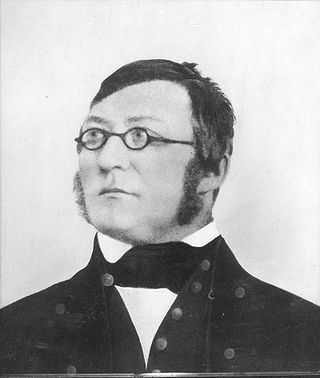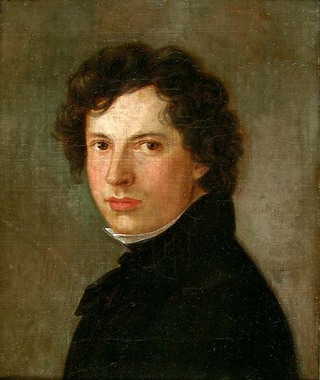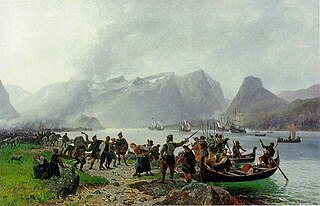Related Research Articles
Norwegian literature is literature composed in Norway or by Norwegian people. The history of Norwegian literature starts with the pagan Eddaic poems and skaldic verse of the 9th and 10th centuries with poets such as Bragi Boddason and Eyvindr Skáldaspillir. The arrival of Christianity around the year 1000 brought Norway into contact with European medieval learning, hagiography and history writing. Merged with native oral tradition and Icelandic influence, this was to flower into an active period of literature production in the late 12th and early 13th centuries. Major works of that period include Historia Norwegie, Thidreks saga and Konungs skuggsjá.

"Ja, vi elsker dette landet" is the Norwegian national anthem. Originally a patriotic song, it came to be commonly regarded as the de facto national anthem of Norway in the early 20th century, after being used alongside "Sønner av Norge" since the 1860s. It was officially adopted in 2019.

Bjørnstjerne Martinius Bjørnson was a Norwegian writer who received the 1903 Nobel Prize in Literature "as a tribute to his noble, magnificent and versatile poetry, which has always been distinguished by both the freshness of its inspiration and the rare purity of its spirit". The first Norwegian Nobel laureate, he was a prolific polemicist and extremely influential in Norwegian public life and Scandinavian cultural debate. Bjørnson is considered to be one of the four great Norwegian writers, alongside Ibsen, Lie, and Kielland. He is also celebrated for his lyrics to the Norwegian national anthem, "Ja, vi elsker dette landet". The composer Fredrikke Waaler based a composition for voice and piano on a text by Bjørnson, as did Anna Teichmüller.

Henrik Arnold Thaulow Wergeland was a Norwegian writer, most celebrated for his poetry but also a prolific playwright, polemicist, historian, and linguist. He is often described as a leading pioneer in the development of a distinctly Norwegian literary heritage and of modern Norwegian culture.

Johan Sebastian Cammermeyer Welhaven was a Norwegian author, poet, critic, and art theorist. He has been considered "one of the greatest figures in Norwegian literature."

Jacobine Camilla Collett was a Norwegian writer, often referred to as the first Norwegian feminist. She was also the younger sister of Norwegian poet Henrik Wergeland, and is recognized as being one of the first contributors to realism in Norwegian literature. Her younger brother was Major General Joseph Frantz Oscar Wergeland. She became an honorary member of the Norwegian Association for Women's Rights when the association was founded in 1884.

The history of Jews in Norway dates back to the 1400s. Although there were very likely Jewish merchants, sailors and others who entered Norway during the Middle Ages, no efforts were made to establish a Jewish community. Through the early modern period, Norway, still devastated by the Black Death, was ruled by Denmark from 1536 to 1814 and then by Sweden until 1905. In 1687, Christian V rescinded all Jewish privileges, specifically banning Jews from Norway, except with a special dispensation. Jews found in the kingdom were jailed and expelled, and this ban persisted until 1851.

Bergen Cathedral School is an upper secondary school in Bergen, Norway. Located in the city centre, next to Bergen Cathedral, the school has about 850 students, 95 full-time teachers, and 5 administration personnel, including the headmaster, Karen Kristine Rasmussen.
Nationality words link to articles with information on the nation's poetry or literature.

Creation, Man and the Messiah is the title of an epic poem written by the Norwegian poet Henrik Wergeland in 1829. The scale of the poem invited criticism, especially by Wergeland's counterpart, Johan Sebastian Welhaven. In 1845, while on his deathbed, Wergeland revised the poem and republished it under the title Man.
Nationality words link to articles with information on the nation's poetry or literature.
Emil Boyson was a Norwegian poet, writer, and translator.

George Sinclair was a Scottish mercenary who fought and died in the Kalmar War. He is remembered in popular song in Norway and the Faroe Islands, through the ballad Sinklars Visa.

Nicolai Wergeland was a Norwegian minister, writer and politician, and a member of the Norwegian Constituent Assembly at Eidsvoll that wrote the Constitution of Norway on 17 May 1814. He was elected as one of two delegates from Kristiansand to the Eidsvoll Assembly in 1814. He represented the unionist side, and came very well prepared to Eidsvoll, bringing his own constitution draft. Along with him from Kristiansand came wholesaler Ole Clausen Mørch.

Henrik Anker Bjerregaard was a Norwegian poet, dramatist and judge.

Gunnar Reiss-Andersen was a Norwegian lyric poet and writer.
Events in the year 1841 in Norway.

Agnes Mathilde Wergeland was a Norwegian-American historian, poet and educator. Agnes Mathilde Wergeland was the first woman ever to earn a doctoral degree in Norway.
Papegøien is a farce from 1835, written by Norwegian writer Henrik Wergeland under the pseudonym "Siful Sifadda".
"Sønner av Norge" is the common title of the song "Norsk Nationalsang", which was the de facto national anthem of Norway from 1820 until the early 20th century. From the mid-1860s, "Ja, vi elsker dette landet" gradually came to occupy the unofficial position as national anthem, but was used alongside "Sønner af Norge" until the early 20th century, with "Sønner af Norge" being preferred in official situations.